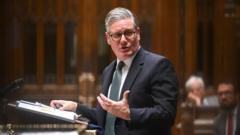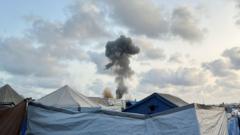In a significant shift, Britain, France, and Canada issued a strong warning to Israel regarding its ongoing military actions in Gaza, underscoring concerns over humanitarian conditions.
Allies Place Pressure on Israel Amid Gaza Conflict Escalation

Allies Place Pressure on Israel Amid Gaza Conflict Escalation
Major powers warn Israel to halt military operations and address humanitarian crisis.
In Northern Gaza, yesterday, major international allies of Israel have officially conveyed robust criticisms of the nation's military strategy in its ongoing conflict with Hamas, emphasizing rising humanitarian crises. Britain announced the suspension of trade discussions with Israel, triggered by the Israeli government’s latest military offensive and its severe blockade on humanitarian support for Palestinians facing potential famine. The joint statement from Britain, France, and Canada described the escalation as "wholly disproportionate" and amounted to the most forceful rebuke from key allies since the war's onset 19 months prior.
These nations openly warned Israel that failure to cease the renewed military actions and to lift restrictions on humanitarian aid would result in "further concrete actions." Israeli Prime Minister Benjamin Netanyahu countered, arguing that the response from Britain, France, and Canada granted Hamas a strategic advantage, characterizing their allegations as encouraging future violence akin to the attacks on October 7, which instigated the war.
While the United States remains Israel's most notable supporter, its stance appears to be wavering as President Trump opted not to publicly critique the current Israeli offensive and omitted a visit to Israel during his recent Middle East trip. Amidst these developments, U.N. humanitarian official Tom Fletcher raised alarms, indicating that 14,000 babies in Gaza are at risk of death within the next 48 hours without immediate relief aid.
These nations openly warned Israel that failure to cease the renewed military actions and to lift restrictions on humanitarian aid would result in "further concrete actions." Israeli Prime Minister Benjamin Netanyahu countered, arguing that the response from Britain, France, and Canada granted Hamas a strategic advantage, characterizing their allegations as encouraging future violence akin to the attacks on October 7, which instigated the war.
While the United States remains Israel's most notable supporter, its stance appears to be wavering as President Trump opted not to publicly critique the current Israeli offensive and omitted a visit to Israel during his recent Middle East trip. Amidst these developments, U.N. humanitarian official Tom Fletcher raised alarms, indicating that 14,000 babies in Gaza are at risk of death within the next 48 hours without immediate relief aid.




















